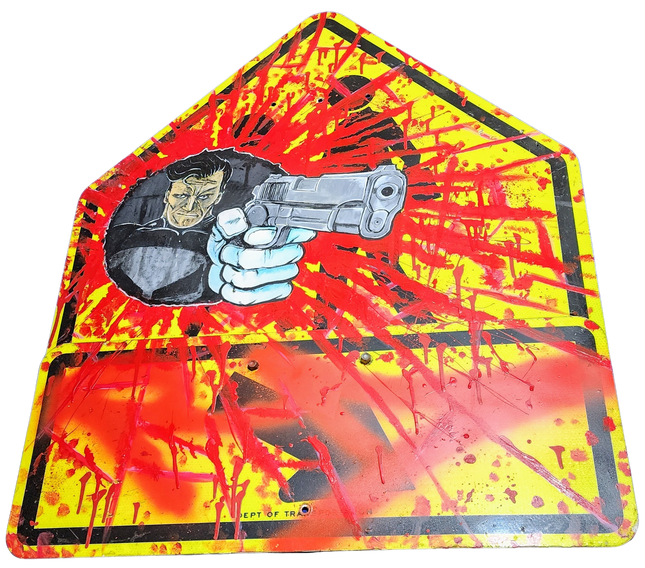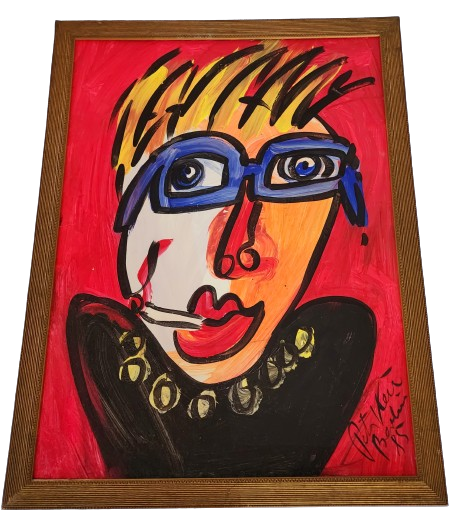Punisher Crossing Original Street Sign Painting by RD-357 Real Deal One of a Kind Artwork on Real Metal Crosswalk Street Sign by Graffiti Art Pop Artist.
2012 Signed Mixed Media Acrylic & Spray Paint on Real Reclaimed NYC New York City Crossing Cross Walk Street Sign Painting Original Artwork Size 30x37.5
RD-357: Pioneering Street Pop Art on Urban Canvases
RD-357, an artist known for his distinctive contribution to street pop art and graffiti artwork, has manifested his creativity through a unique, striking, and thought-provoking medium. His original piece titled "Punisher Crossing Original Street Sign Painting" encapsulates street art's raw essence while ingeniously infusing pop culture iconography elements. This work is a stellar example of RD-357's inventive use of everyday objects as canvases, transforming a mundane metal crosswalk street sign into a vibrant artwork that commands attention and sparks dialogue. The "Punisher Crossing" is a unique artwork that exudes the rebellious spirit and subversive edge often associated with street pop art. Created in 2012, this mixed media piece employs acrylic and spray paint on a real crossing sign measuring 30x37.5 inches. RD-357's choice to use an actual street sign as the foundation for his artwork not only repurposes the object but also embeds the art piece within the fabric of urban life it seeks to comment on. The sign, once a directive for pedestrians, now carries a powerful visual message, made all the more potent by its placement on an object of regulation and order.
The Artistic Language of RD-357's Street Sign Paintings
In "Punisher Crossing," RD-357 demonstrates a masterful control over color and composition. The background of the sign is ablaze with a vivid, almost violent splatter of yellow and red spray paint, reminiscent of the chaos and energy of city streets. Against this explosive backdrop, the figure of the Punisher is rendered with precision in acrylic, his stark, menacing presence immediately drawing the eye. The character's hand, outstretched and holding a gun, breaks the boundaries of the sign's frame, suggesting a defiance of constraints and a breaking free from imposed limits. RD-357's work is deeply embedded in the language of street pop art, a genre that combines the gritty, underground aesthetic of street art with the bright, graphic quality of pop art. His paintings, especially this piece, are a dialogue between the artist and the urban landscape, between the fictional characters of pop culture and the reality of the viewer's environment. By bringing the Punisher - a symbol of vigilante justice and anti-heroism - into the context of a crosswalk sign, RD-357 creates a juxtaposition that is at once startling and intriguing. The artwork becomes a statement on control and chaos, power and powerlessness, and the fine line between societal order and individual action.
RD-357's Impact on Contemporary Street Art
RD-357's contributions to the street art scene have been significant, and his influence can be seen in the way street pop art has evolved over the years. His artworks, particularly those on street signs, are more than mere paintings; they are interventions into the urban environment, which challenge the viewer to reconsider the role and potential of public space. The "Punisher Crossing" sign is emblematic of this approach, seamlessly integrating art into the city's daily liandlso elevating the discourse around street art. By signing his work, the artist claims ownership of a public domain piece, an act that is a form of artistic rebellion. The signature on "Punisher Crossing" is not merely a mark of authenticity; it is a declaration of presence, a proof of the artist's interaction with the world around him. Through works like this, RD-357 has etched his name into the annals of street pop art history, securing his place as a maverick who has expanded the possibilities of graffiti artwork. The "Punisher Crossing Original Street Sign Painting" by RD-357 stands as a testament to the power of street pop art to communicate, provoke, and inspire. By transforming a simple street sign into a complex and compelling work of art, RD-357 challenges perceptions, invites reflection, and continues influencing the ever-evolving narrative of street and graffiti art.
Read more less



